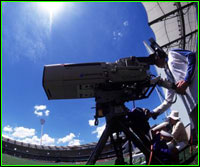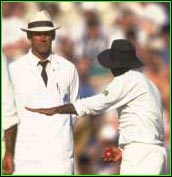Find a better system
Daniel Laidlaw
It's been written about many times before, in protest or exasperation at
its varying deficiencies or inconsistencies, and it will be written about
again. But the merits and use of technology in umpiring is worth continued
examination until eventually something is done to improve it. Sooner or
later, the right people will take heed.
What we have in the technology-in-cricket debate, and in fact have had for
while on several issues, is a modern game grappling with its traditional
past. Cricket is a sport with a sense of its own history and values like
no other, something which hopefully will never change, but nevertheless tends
to make innovation painful.
 We see this internal struggle in various forms: Player behaviour (whether
it be sledging or dissent), umpiring, use of technology and combinations of
all three. Attempting to retain traditional elements of competition and stay
modern is a near-impossible juxtaposition. Most times one has to be
sacrificed and if cricket is to stay relevant, it can’t always be
modernity.
We see this internal struggle in various forms: Player behaviour (whether
it be sledging or dissent), umpiring, use of technology and combinations of
all three. Attempting to retain traditional elements of competition and stay
modern is a near-impossible juxtaposition. Most times one has to be
sacrificed and if cricket is to stay relevant, it can’t always be
modernity.
This certainly does not mean the game has to compromise any of its core
appeal or values (in fact, they have slipped because they have not been
strictly enforced enough to adjust to the times), but we have to realise
that progress is usually positive. So, while retaining commonsense and
without indiscriminately applying the use of technology, let’s cease the
juggling act and do whatever we can to advance the game.
Despite what a few maintain, the glorious uncertainty that is such a
charming part of the sport was never intended to refer to poor umpiring.
There is enough uncertainty to keep us enthused without that. The
legitimate fear that umpires will have their authority and very role undermined by an
increased reliance on technology does not have to be realised. Umpires
will remain the game's arbitrators regardless of how much technology is
introduced because, after all, we still require a final authority to
interpret what is seen on a TV screen.
It need not be complicated, as it is now, with the inconsistent use of
replays to determine some decisions and not others. There are probably
several ways to make the use of technology in umpiring relatively simple
and consistent, but the following is the system I would favour, relating
specifically to disputed catches, which has become the most contentious
area of the game in the past year or so.
A catch is claimed close to the ground and the batsman is unsure of its
legality. The umpires, themselves not entirely sure, confer and reach a
decision, which they then signal. Because they cannot be completely
certain of their verdict, they refer their call to the third umpire for review. If
he deems their decision conclusively incorrect, he should have the power
to overturn it and the game proceeds. If, however, the replay is unclear –
and in catching decisions, it virtually always is – the third umpire transfers
authority back to those on the field, whose original decision stands.
As of now, this would only apply to run outs, stumpings and catches. When
the ability of technology to determine other decisions such as lbws and
edges is proven, then it can apply to those decisions as well.
It should be clear to all that current TV replays are not sufficient to
rely upon for all disputed catches. Whatever the human limitations of on-field
umpires, they have instinct and a close real-time vantage point on their
side. Replays, on the other hand, are more often than not inconclusive,
due to the parabola in the ground that can make a certain catch appear a
non-catch. Because of that inherent uncertainty, the on-field umpires must
always have a role in adjudicating on catches.
 This scenario would be as effective as the limited technology allows it to
be, for if replays are deemed conclusive by the third umpire they can be
relied upon, and if they are not then the on-field umpires would have
their way. It is not perfect, as there will be many arguments as to what
constitutes a conclusive replay and what does not, which simply highlights
the imperfect nature of replays in determining whether leather touches
grass on a curved oval. As and when technology improves, so too will these
decisions.
This scenario would be as effective as the limited technology allows it to
be, for if replays are deemed conclusive by the third umpire they can be
relied upon, and if they are not then the on-field umpires would have
their way. It is not perfect, as there will be many arguments as to what
constitutes a conclusive replay and what does not, which simply highlights
the imperfect nature of replays in determining whether leather touches
grass on a curved oval. As and when technology improves, so too will these
decisions.
Until that happens, relying solely on the third umpire’s interpretation of
replays, with all authority removed from the on-field umpires once they
draw their magic squares in the air, will continue to result in almost every
contested catch being found not out, when in most cases a good number of
them are surely taken. A wrong decision in favour of the batsman is just
as unsatisfactory as being given out off a bump ball. In effect we are
utilising technology to reach the same number of wrong conclusions, just
more circuitously.
The losers in this have been the players. If there is one thing TV replay
technology has proved, it is that fielders do NOT always know whether or
not they have cleanly held a catch. Honest cricketers have been made to look
like cheats through no fault of their own. There have been so many close
decisions where fielders instinctively but wrongly believe they have
caught the ball that it is clear the contention that “the fielder always knows”
is false. Because of a lack of understanding by the public, a green light to
a claimed catch can tarnish the image of an innocent fielder who genuinely
thinks, sometimes correctly, that he has claimed a catch. Brian Lara, a
notably principled cricketer who has suffered from this situation, comes
readily to mind.
So let’s not vacillate any longer. It’s a professional game worthy of
professional officiating. Find a system, any system, to genuinely make it
better.
More Columns
Mail Daniel Laidlaw